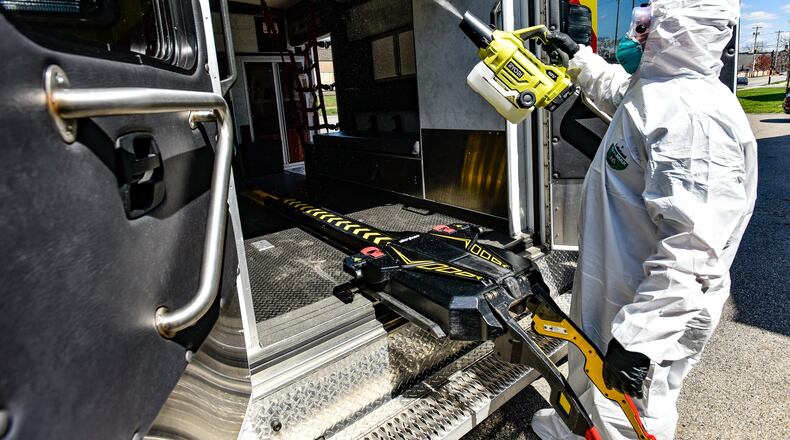“We did that out of just out of being exceptionally cautious with our people,” Fire Chief Mark Mercer said about the initial quarantine. But after meeting with Hamilton Health Commissioner Kay Farrar on Thursday morning and comparing what happened with her guidelines, “they don’t need to be quarantined,” he said.
“They didn’t meet the guidelines for a significant exposure,” Mercer said. “The one guy did have a little bit more of an exposure. It was still very low, but to keep our people safe, and keep our citizens safe, we’re going to leave him off.”
Even so, with federal and state officials saying the number of COVID-19 cases will increase greatly in coming weeks, there may come a point where paramedics and other health care workers who otherwise would be quarantined actually will have to be called back to duty, in Hamilton and elsewhere, to meet heavy demand.
“We’re a long way from that, though,” Mercer said.
He noted CDC guidelines give overall recommendations, but they also note, essentially, “if you have 25 percent of your workforce unable to work, you may have to not do this.”
“For us, that’s a huge decision, because we’re not only exposing ourselves, which could potentially make other people sick, we’re also potentially exposing the outside population, who doesn’t need it, that may not do well with it,” Mercer said.
One thing that’s to Hamilton’s advantage is officials’ budget decision at the the start of this year, partly at the prompting of the firefighters’ union, to increase to four ambulances staffed with paramedics, up from three.
Erik Neal, 31, a medic with the fire department’s Medic 22 ambulance who has been with Hamilton since late 2016, said even in cases that have nothing to do with coronavirus, such as sprained ankles, crews are paying attention to illness symptoms. They ask if patients have coughs, fever and other symptoms of the virus, or if anyone they live with has those symptoms.
They also wear more protective equipment, such as eye protection, protective overalls or gowns, and N-95 masks when warranted.
The department has made one change since the man died Sunday of coronavirus, and his test results came back positive on Monday: Contrary to the culture in which city firefighters all pitch in to help with a situation, they now are being encouraged to hold back, and let one handle most of the work with a patient.
“If we only need one of our firefighters to assess a patient and get them the proper treatment, we’re making sure that we keep everybody else away,” Mercer said. “It’s hard because the nature of our firefighters, and one of their greatest features is that when they go to work, they all go to work, and they all pitch in, and nobody stands back.”
But this virus will prompt a temporary change in that, he said.
How does Neal deal with the stress of possibly taking the virus home to his wife?
“I will be honest, I do have that concern,” Neal said. “I know there’s other guys on this department, especially ones that have kids, they’re incredibly concerned about the potential for us to carry that home with us.”
Firefighters wear the protective equipment recommended by the CDC and follow department procedures, he said. They also decontaminate their equipment and the emergency squads. And when there is suspected exposure, they wash their uniforms and shower after the run, he said.
“It’s always on our minds, and that’s what keeps us extremely diligent about following the procedures that we have established here, and continual use of PPE (personal protective equipment).”
After crews transport someone they suspect has the virus, they fog the back of the city ambulance with a decontamination solution, let it sit 10 minutes, and then wipe it down, Mercer said. The vehicles now are deep-cleaned daily, rather than weekly.
Neal has been on runs where firefighters highly suspected patients had the virus, but after they were tested, “As of yet, I have not come into contact with anybody that’s confirmed to have had it, but we have had people that have listed those symptoms.”
More than usual, people have been expressing their appreciation for what firefighters are doing.
“Pretty much every member of the public that’s interacted with us, they’ve conveyed their appreciation,” he said. “They’ve thanked us for being out there. They appreciate that we’re still out working.”
“We always appreciate the public support,” he said.
He’s glad that some people have been less likely than usual to call emergency 911 for minor things that they normally would. That’s appropriate, because when people are taken to an emergency room, they’re more likely to come into contact with the virus, he said.
Coronavirus resources
- Ohio Department of Health hotline: 1-833-4-ASK-ODH (staffed from 9 a.m. to 8 p.m. each day)
- ODH updates: coronavirus.ohio.gov
- Ohio Department of Mental Health and Addiction Services helpline: 1-877-275-6364
- National Alliance on Mental Illness Butler County hotline: 1-844-4CRISIS
- Ohio crisis text line: Text keyword "4HOPE" to 741 741
- Butler County hotline for seniors who need help: 513-721-1025
- Butler County hotline for those who want to help seniors: 513-623-3891
- Complete Journal-News coverage: bit.ly/coronavirusjn
About the Author


